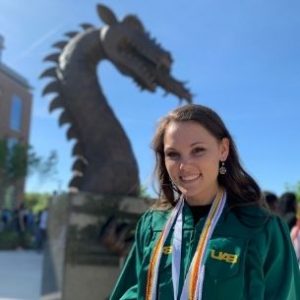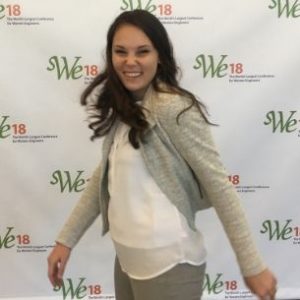 Emma Godwin spent her undergraduate years at The University of Alabama at Birmingham (UAB) because it was the only school in Alabama to offer Biomedical Engineering as a major. Her sophomore year, she got involved with the Society of Women Engineers (SWE) on campus. “I was really drawn to get involved with the SWE in undergrad when I heard the 2016 statistic that only 9% of engineers are women.* That sounds like a statistic from the ’70s or something.”
Emma Godwin spent her undergraduate years at The University of Alabama at Birmingham (UAB) because it was the only school in Alabama to offer Biomedical Engineering as a major. Her sophomore year, she got involved with the Society of Women Engineers (SWE) on campus. “I was really drawn to get involved with the SWE in undergrad when I heard the 2016 statistic that only 9% of engineers are women.* That sounds like a statistic from the ’70s or something.”
Emma was treasurer for SWE and then president for two years. In 2017, she was recognized as the UAB Engineering Student of the Year. She added a second bachelor’s in Physics before leaving UAB. As if her involvement and two challenging majors weren’t enough, she also worked her last year at UAB as an engineering intern and then systems engineer in the Engineering and Innovation Technology Department. She worked just short of the full-time limit (38 hours per week) so she could maintain her status as primarily being a student.
One week after graduation in 2019, Emma married and moved to Tennessee to join her husband. After a few months, however, she accepted a job as a mechanical engineer for Southern Research and relocated back to Birmingham, where the two now live. She is the only woman engineer in a department of about 30. The company’s educational benefit provided an avenue for her to pursue graduate work.
“Southern Research will pay up to a certain amount for tuition, and with the downtime 2020 gave me in my personal life, it seemed like a good time to earn my master’s.” Since she’s an Auburn fan by birth, Emma wasn’t personally motivated to consider programs from The University of Alabama, but she couldn’t deny the opportunity of a premium experience at a cut-rate price in the 100% online Master of Science in Mechanical Engineering program. “Alabama was the best value for the money. I got heat from my family about going to UA, but my husband’s family are Alabama fans, so they’ve cheered me on,” she said.
She was also drawn to UA because of its innovation in academic planning and delivery. “You can’t earn a PhD online at many schools, but Alabama has figured out a way to do that without sacrificing quality. You may not get it done in a year, but you can balance the schoolwork alongside your career and earn the degree without having to take so much time off from work.” This means that in the future, she can consider a PhD while continuing to work – but for now, she’s focused on her master’s, which she began in Fall 2020.
 At work, she’s designing and building a gimbal system for the U.S. Navy to use on ships and aircraft. This project has kept her busy, but the online program has allowed her the flexibility to balance school alongside work and family. She cites the ability to watch lectures at two times the recorded speed as a major plus that helps her maximize her time. And the coursework is helping her at work!
At work, she’s designing and building a gimbal system for the U.S. Navy to use on ships and aircraft. This project has kept her busy, but the online program has allowed her the flexibility to balance school alongside work and family. She cites the ability to watch lectures at two times the recorded speed as a major plus that helps her maximize her time. And the coursework is helping her at work!
“Right now, I’m in Mechanical Vibrations with Dr. Steve Shepard — he’s the associate department head for Mechanical Engineering. He’s a great teacher with lots of industry experience, and that makes all the difference, especially since I’ve never had a formal class in vibrations. As we get to the next steps of the gimbal system project, we’re about to start testing it and the content from Vibrations is very helpful in the real world: isolating components, finding resonance modes inside the system, and designing the system in such a way to drive those modes outside the intended environmental envelope so that you don’t get major displacements (and thus mechanical failure).” She explained that their testing phase will include rigorous vibrations through a shake table. “The class is helping to bridge the gap between theory and reality,” she said.
Other coursework has helped reinforce concepts that she couldn’t focus on in depth during her bachelor’s due to time constraints. “There were things that I sort of understood from undergrad, but now I feel like I totally understand them. For example, Fourier series was always met with a handwave and a blind follow-the-formula mentality, but now I physically understand it to be the mathematical magic that lets us decompose complex signals into summations of simple sines and cosines. A major point of comprehension that went unrealized in undergrad.”
physically understand it to be the mathematical magic that lets us decompose complex signals into summations of simple sines and cosines. A major point of comprehension that went unrealized in undergrad.”
Emma has taken advantage of the resources UA offers its students outside of class as well. She has attended virtual meetings of the American Institute of Aeronautics and Astronautics and has connected with the Career Center. “I feel like the resources, career fairs, speakers and other opportunities I’ve been afforded at Alabama have alone been worth the money. You can tell there’s a team dedicated to connecting Engineering students with industry, academia, peers, and professors – and that makes all the difference.”
While balancing her career, family and education, Emma has found time to give back to SWE too, appearing as a guest speaker at a UAB section meeting. “It was a weird transition because I used to be the one to schedule and introduce those, and now they asked me to be the speaker,” she said.
Emma sees potential for management as her future, recognizing the value she could bring to leadership, and she’s thankful for the opportunity to prepare for that by earning her master’s — and potentially a PhD — online. “Even if I had gone with UAB, which is just 15 minutes away from me, there’s no way I would have time to get my master’s if it were in person or even hybrid. I think the accessibility and quality that Bama offers is reason alone to offer up my first, albeit conflicted, Roll Tide.”
*Updated statistics from 2018 indicate that the percentage of women in engineering has increased to 13%.
Published: March 3rd, 2021

